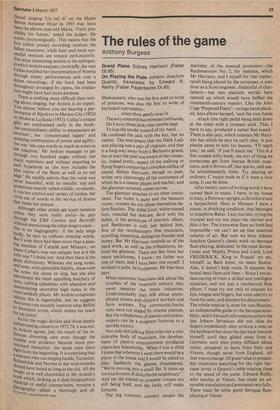The rules of the game
Anthony Burgess
Grand Piano Sidney Harrison (Faber £6.95) On Playing the Flute Johann Joachim Quantz, translated by Edward R. Reilly (Faber Paperbacks £4.95) Shakespeare, who was the first poet to write of potatoes, was also the first to write of keyboard instruments: ... when thou gently sway'st The wiry concord that mineear confounds, Do [envy those jacks that nimble leap To kiss the tender inward of thy hand ... He confused the jack with the key, but no matter. The instrument that the Dark Lady was playing was a pair of virginals, and that is a long way away from a Bechstein grand, but at least the poet was aware of the romantic, indeed erotic, aspect of the walking or flying fingers conjuring a complete edifice of sound. Sidney Harrison, though no poet, writes very charmingly of the instrument of which he is a master player and teacher, and the glamour certainly comes across.
The glamour attaches to no other instrument. The violin is puny and the bassoon comic; women do not abase themselves before flautists. The Abbe Liszt, white-maned lion, muscled but delicate, devil with the ladies, is the prototype of pianistic allure, and Beethoven is only just behind him, first of the revolutionary free musicians, scowling, imperious, doling out thunder and honey. But Mr Harrison reminds us of the hard work, as well as the tribulations, behind the glamour. There are few lions but many packhorses. I know; my father was one of them, and I have been one myself. I worked in pubs, he in cinemas. Mr Harrison says: When economic historians talk about the troubles of the twentieth century they never mention the music industries. Understandably they talk about unemployed miners and shipyard workers and farm workers. The communist-fascist riots were not staged by cinema pianists. But the tribulations of pianists and pianomakers can be a poignant footnote to a terrible history.
Not only did talking films wipe out a considerable body
of musicians, the development of passive entertainment produced piano-less households. 'When I was a child I knew that wherever I went there would be a piano in the house and I would be asked to play. Suddenly the pianos disappeared. "We're moving into a small flat. It takes up too much room. It disturbs the neighbours".' And yet the maned or cropped virtuosi are still being bred, and the lucky still make fortunes.
The big romantic concerti remain the mainstay of the musical promoters—the Rachmaninov No. 2, for instance, which Mr Harrison, and I myself for that matter, recall being played by the composer, a man dour as a Scots engineer, disdainful of charlatanry—but new pianistic worlds have opened up which would have baffled the nineteenth-century maestri. Like the John Cage 'Prepared Piano'—strings hand-plucked, keys elbow-banged, 'and the iron frame . . . struck (the 'right pedal being held down at the time) with a tympani stick. This, I have to say, produced a rather fine sound.' There is also jazz, which interests Mr Harrison but which he says he can't play. A jazz
pianist came to him for lessons. teach you,' he said, `if you'll teach me.' This is a fine modest witty book, the sort of thing we sometimes get from literate British musicians, and it throws off, like sparks, odd useful schoolmasterly hints. Try playing an ordinary C major scale as if it were a love song. It can be done.
After twenty years of writing words I have turned back to music. I have, in my house in Italy, a Steinway upright, a clavichord and a harpsichord. Here in Monaco I have a piano, in shocking condition, that belonged to Josephine Baker. lam, too late, trying the trumpet and my son plays the clarinet and flate a bee. The transverse flute we both find impossible—we can't set up that essential column of air. But now we have Johann Joachim Quantz's classic work on baroque flute-playing, dedicated `to the most Serene, Great and Mighty Prince and Lord, Lord FREDERICK, King in Prussia' etc etc, himself, as Bach knew, no mean flautist. Alas, it doesn't help much. It assumes the brutal basic facts and then—'Since I am endeavouring to train a skilled and intelligent musician, and not just a mechanical flute player, I must try not only to educate his lips, tongue and fingers, but must also try to form his taste, and sharpen his discernment.' The whole treatise is, even for non-flautists, an indispensable guide to the baroque sensibility, and it has such information as how the late Johann Sebastian did not raise his fingers imMediately after striking a note on the keyboard but drew the tips back towards himself, until they glided away from it. Germans were then pretty diffident about music, prepared to learn from Italy and France, though never from England. All that was to change. Of great value to presentday musicians searching for the right baroque tempi is Quantz's table relating these to the speed of the pulse. Edward Reilly, who teaches at Vassar, has made an admirable translation and annotated very fully. There must be some good baroque fluteplaying at Vassar.


































 Previous page
Previous page